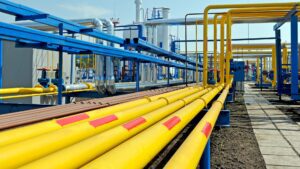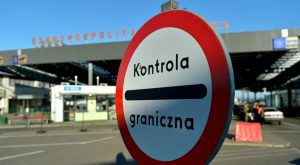
Consignors – which can only be Gazprom – have not been interested by offers of additional capacities for gas transportation through Ukraine for June from Gas Transmission System Operator of Ukraine (GTSOU).
Gazprom has a long-term reservation of Ukrainian capacities in the volume of 40 billion cubic meters for 2021, which is equal to 109 million cubic meters per day. The company additionally booked 15 mcm at auction on May 17, giving a total of 124 mcm per day.
GTSOU offered an additional 63.7 mcm per day at the monthly auction on Tuesday; however, there were no bids for this. The outcome of the last major additional auction a month ago was the same.
The announcement of this auction – with the prospect of significant supply growth on the European market – and its outcome have a substantial influence on spot prices for gas on the European market. They reduce under pressure of the appearance of potential new supply and rebound following an unsuccessful auction. Meanwhile, Gazprom prefers not to comment on its plans regarding short-term reservation of Ukrainian capacities.
Gazprom is currently pumping 124 mcm per day on average through Ukraine, fully using the volume booked.
If Gazprom had accepted the offer to use additional transit capacities, it would have meant a return to transportation volumes through Ukraine of 2019, before the new transit contract and payment of $3 billion to Naftogaz in line with a Stockholm arbitration ruling.
Europe is currently dramatically increasing gas consumption. Global supplies of liquefied natural gas and pipeline gas from Russia are at their highest levels, but this so far impedes the start of mass replenishment of gas in underground storage facilities to prepare for next winter.

Consignors – which can only be Gazprom – have not been interested by offers of additional capacities for gas transportation through Ukraine for May from Gas Transmission System Operator of Ukraine (GTSOU).
Gazprom has a long-term reservation of Ukrainian capacities in the volume of 40 billion cubic meters for 2021, which is equal to 109 million cubic meters per day. The company additionally booked 15 million cubic meters (mcm) at an auction on April 19, giving a total of 124 mcm per day.
GTSOU offered an additional 63.7 mcm per day at the monthly auction on Tuesday; however, there were no bids for this.
Gazprom is pumping 124 mcm per day on average through Ukraine in April, fully using the volume booked.
If Gazprom had accepted the offer to use additional transit capacities, it would have meant a return to transportation volumes through Ukraine of 2019, before the new transit contract and payment of $3 billion to Naftogaz in line with a Stockholm arbitration ruling.
Europe is currently dramatically increasing gas consumption. Global supplies of liquefied natural gas and pipeline gas from Russia are at their highest levels, but for now, this does not make it possible to start mass pumping of gas into underground storage facilities to prepare for next winter.
In January 2021, Gazprom transported 124.51 mcm per day on average through Ukraine, in February – 104 mcm, and in March – 119.5 mcm.

Transit of oil through the territory of Ukraine by pipelines to European countries and Belarus in January-March 2021 decreased by 14.2% (by 488,300 tonnes) compared to the same period in 2020, to 2.959 million tonnes, according to the data of JSC Ukrtransnafta.
In particular, transit in the direction of Budkovce (Slovakia) amounted to 1.986 million tonnes (less by 13.4% compared to January-March 2020), Fenyeslitke (Hungary) – 702,300 tonnes (less by 21.3%), Mozyr (Belarus) – 270,600 tonnes (more by 3.5%).
The volume of oil transportation to refineries of Ukraine in the first quarter of this year amounted to 526,000 tonnes, which is 11.2% (66,100 tonnes) less than in January-March 2020. In particular, oil transportation along the Odesa-Kremenchuk route amounted to 197,900 tonnes (less by 13.9%).
Thus, in 2020, the total transportation of oil through the company’s pipelines amounted to 3.485 million tonnes (less by 13.7%). The share of transit volume in it is 84.9%, pumping to the country’s refineries – 15.1%.
In March 2021, oil transit through Ukraine by pipelines fell by 35.3% (by 492,800 tonnes) compared to the same month in 2020, to 903,000 tonnes.
Pumping to Ukrainian refineries last month decreased by 0.5% (by 900 tonnes), to 195,400 tonnes.
Ukrtransnafta said among the factors that influenced the total volume of oil transportation in the first quarter of 2021 were a decrease in oil demand among European consumers due to quarantine measures and the withdrawal of an oil refinery in Hungary for scheduled repairs.

Gazprom is booking extra capacities for gas transit through Ukraine for March at the same additional reservation volume as for February, according to the results of the monthly Regional Booking Platform (RBP) auction.
Gazprom has a long-term reservation of Ukrainian capacities in the volume of 40 billion cubic meters for 2021, which is equal to 110 million cubic meters per day.
The Russian gas company booked extra transit capacities for March via RBP on Monday. It requested 14.2 mcm per day of the offered 15 mcm per day. The auction result was the same for February.
From February 1 to 13, Gazprom pumped an average of 119.1 mcm per day through Ukraine, with a minimum amount of 115.4 mcm and a maximum of 121 mcm.
In January 2021, the company transported 124.51 mcm per day on average through Ukraine, and in December – 182.63 mcm per day.

The Ministry of Infrastructure of Ukraine expects that in 2021 the volume of transit of goods through the territory of Ukraine will recover to the level of 2019.
“We are waiting for the resumption, growth of transit. We would definitely recover to the level of 2019. But in order for it to grow, we need the economies of countries that send goods to each other develop,” Infrastructure Minister of Ukraine Vladyslav Krykliy said in an exclusive interview with Interfax-Ukraine.
The minister also said that the pandemic has fundamentally changed communications between countries.
“Probably, the greatest positive thing from the coronavirus, so to speak, is that we switched to more dynamic communications, including on the creation of digital transport corridors. If a year ago the issue of digital corridors, uniform transport rules and a single document was considered a prospect, which we must strive for, now digitalization is a necessity,” he said.
According to Krykliy, this is the only way the countries participating in the East-Europe transit traffic will be able to build alternative transport corridors that will develop through a digital tool, information exchange and through the interaction of all operators participating in these intermodal transportation, in order to eventually become competitive with Russia.

Ukraine has fulfilled all the obligations assumed during the meetings of the Mixed Commissions on International Road Freight Transport, but the Polish side does not honor the agreement at the presidential level, the Ministry of Infrastructure of Ukraine has said.
As reported on the website of the Ministry of Infrastructure, a working meeting of the Ministers of Infrastructure of Ukraine and the Republic of Poland Vladyslav Krykliy and Andrzej Adamczyk was held in Kyiv on Monday, during which the Ukrainian minister pointed out the fact that Ukraine’s fulfillment of its obligations led to a significant increase in the share of use of permits for 2019 by Polish haulers.
Krykliy reiterated that Poland should lift transit restrictions for Ukrainian haulers, since this negatively affects not only trade relations between the two countries, but also with other EU countries.
At the same time, he said that Ukrainian haulers are ready to compete in the two-sided market.
The ministers of Ukraine and Poland also discussed the work of crossing points across the Ukrainian-Polish border, in particular, the Korcheva-Krakovets point.
In addition, Krykliy said that currently the Verkhovna Rada is expected to consider at second reading a bill that solves the problem of VAT payment by work performers and service providers under the so-called “Polish loan,” but asked the Polish side to speed up the work of the construction company to repair the crossing point.
The Ukrainian minister suggested that the Polish side conduct a joint audit to determine the possible reasons for the appearance of queues at the border crossing points with the involvement of a third independent party, and introduce general border and customs control at crossing points to increase their efficiency.